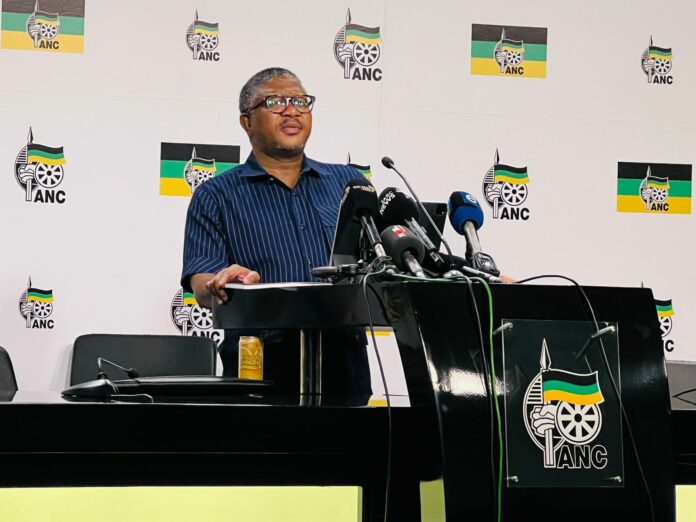The government has clarified its position regarding the International Criminal Court (ICC) after earlier comments suggested it plans to withdraw from the ICC.
ANC secretary-general Fikile Mbalula and ruling party president Cyril Ramaphosa previously stated government’s intention to pull out from the ICC citing concerns over unfair treatment and bias.
During a state visit of Finnish President Sauli Niinistö on Tuesday, Ramaphosa expressed his support for the ANC’s decision to withdraw from the ICC.
However, he also said he hopes a dialogue can be initiated regarding the perceived unfair treatment that South Africa has received from the international court.
Ramaphosa mentioned the criticisms leveled against the ICC by Amnesty International and others, and emphasized a need for proper discussion of unfair treatment.
“Yes, the ANC has taken a decision that it is prudent that South Africa should pull out of the ICC, largely because of the manner in which the ICC has been seen to be dealing with these types of problems, and there’s also been commentary, I believe, from Amnesty International on what many people believe is unfair treatment,” said Ramaphosa.
“Our view is that we would like this matter of unfair treatment to be properly discussed.”
He stated that any decision on how South Africa will respond if Putin were to visit the country will be communicated at a later stage.
Meanwhile, during a media briefing on Tuesday, Mbalula expressed ANC’s support for the arrival of Putin for a Brics summit in August.
Mbalula also criticized the ICC, saying it only serves the interests of a few and that powerful countries like the US, who have not signed the ICC treaty, are the ones responsible for causing chaos in the world.
He said South Africa is non-partisan on the Russia and Ukraine conflict, adding that if the country is punished for its stance, it will have to face the consequences.
A few hours after the initial statements, Vincent Magwenya, spokesperson for the Presidency, and ANC spokesperson Mahlengi Bhengu-Motsiri issued separate statements to correct the error.
They affirmed that South Africa is still a member of the ICC and will continue to support the fair and consistent application of international law.
They admitted that the president and the ruling party had made a mistake by stating that South Africa has withdrawn from the ICC, clarifying that withdrawal will only be considered as a last resort if other options fail to produce desired outcomes.
“The ANC’s post-NEC [national executive committee] statement reflects the discussions of the NEC in this regard,” said Bhengu-Motsiri.
“At the press conference, the secretary-general provided a reflection on the NEC discussion to the extent that a withdrawal from the ICC was also raised.
“Importantly, it was raised as a measure of last resort that would arise if, and only if the other options outlined above do not yield the desired results of fairness and consistency in the administration of international law.
“In outlining this broad context of discussion, an unintended impression may have been created that a categorical decision for an immediate withdrawal had been taken.
“This is not so. We reiterate the resolution of conference remains our policy position until such a point where its implementation does not yield the required result.”
According to Magwenya, South Africa is working on strengthening global governance institutions and on invigorating the Malabo protocol to establish a continental criminal court that will work with the ICC.
He said government is also considering changing its laws to reflect all the articles of the Rome Statute including a provision for the waiver of immunities for persons charged by the ICC from third-party countries where there is no referral by the UN security council.
The UK’s approach to incorporating this provision has been recommended as a model to follow.
“In remaining a signatory to the Rome Statute, South Africa is guided by the importance of strengthening institutions of global governance,” said Magwenya.
“Accordingly, South Africa will work to invigorate the Malabo protocol that would establish a continental criminal court that would complement the ICC as a court of last resort.
“Furthermore, South Africa is considering a legislative amendment that would domesticate the Rome Statute, so that it reflects all the articles of the Rome Statute.”
He explained further: “This includes provision of article 98 of the statute that requires a waiver of immunities for persons charged by the ICC from third-party countries where there is no referral by the United Nations security council.
“The manner in which the UK domesticated the Rome Statute to incorporate the provisions of article 98 has been recommended as a guideline case study.”
To read more political news and views, click here.
Follow @SundayWorldZA on Twitter and @sundayworldza on Instagram, or like our Facebook Page, Sunday World, by clicking here for the latest breaking news in South Africa. To Subscribe to Sunday World, click here



